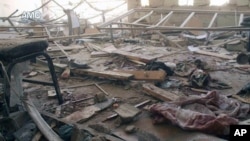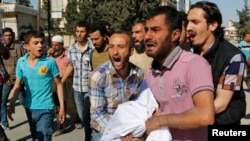UNITED NATIONS —
An air strike by Syrian fighter jets hit a school in the northern city of Aleppo on Wednesday, killing 18 people - many of them children.
Activists, including the Britain-based Syrian Observatory for Human Rights, said the air strike hit the Ain Jalout school in the Al-Ansari district of Aleppo.
Videos posted by the activists show blood and debris and the bodies of at least 10 children on the floor.
The Observatory says at least 18 people died in the attack, while the Aleppo Media Center says 25 children were killed.
The United Nations Children's Fund said it is "outraged by the latest wave of indiscriminate attacks perpetrated against schools and other civilian targets across Syria."
At least 150,000 people have been killed in Syria's 3-year-old civil war, a third of them civilians, the Syrian Observatory for Human Rights said.
At the United Nations on Wednesday, U.N. humanitarian chief Valerie Amos said that the Security Council resolution intended to improve humanitarian access to millions of people in Syria is not working and the council must do more.
After briefing the council for two hours in a closed session, Amos said that in the two months since the council unanimously adopted resolution 2139 the hoped for changes on the ground have not come.
In resolution 2139, the council unanimously demanded the parties facilitate the quick and safe delivery of aid, including across conflict and border lines.
“Far from getting better, the situation is getting worse. Violence has intensified over the past month taking a horrific toll on ordinary Syrians,” Amos said.
She said public pressure and private diplomacy have yielded very little progress, and it is now up to the council to act to get aid to the more than 9 million people inside Syria who desperately need it, especially those under siege and in hard-to-reach areas.
While the U.N. and its agencies have succeeded in getting limited aid to millions of Syrians, Amos said it is not enough.
While she did not say if she explicitly asked the council to adopt a resolution under Chapter 7 of the U.N. Charter that would allow the council to take stronger action to implement its demands, Amos said she reminded them that in Bosnia and Somalia it took several Chapter 7 resolutions to ultimately get the access humanitarians needed.
French Ambassador Gérard Araud was not optimistic that the 15-nation council would be able to act in a unified way to take further measures.
“My personal feeling is, unfortunately after what I heard, nothing that we could table to the council could pass. Really, we have the impression of an unconditional defense of the regime,” Araud said.
Russia, which along with China, has used its veto on three occasions to protect the Assad regime, would be likely to block any tough council action.
The Syrian opposition coalition representative in New York, Najib Ghadbian, urged the U.N. to move ahead with cross-border access - with or without Syrian government consent - to save Syrian lives.
A report from U.N. Secretary-General Ban Ki-moon issued last week paints a grim picture, saying two months after resolution 2139 “none of the parties to the conflict have adhered to the demands of the council.”
Ban warned that denying food and life-saving medical supplies is arbitrary and unjustified and a “clear violation of international humanitarian law.”
Western powers have urged Syria’s referral to the International Criminal Court at The Hague.
Activists, including the Britain-based Syrian Observatory for Human Rights, said the air strike hit the Ain Jalout school in the Al-Ansari district of Aleppo.
Videos posted by the activists show blood and debris and the bodies of at least 10 children on the floor.
The Observatory says at least 18 people died in the attack, while the Aleppo Media Center says 25 children were killed.
The United Nations Children's Fund said it is "outraged by the latest wave of indiscriminate attacks perpetrated against schools and other civilian targets across Syria."
At least 150,000 people have been killed in Syria's 3-year-old civil war, a third of them civilians, the Syrian Observatory for Human Rights said.
At the United Nations on Wednesday, U.N. humanitarian chief Valerie Amos said that the Security Council resolution intended to improve humanitarian access to millions of people in Syria is not working and the council must do more.
After briefing the council for two hours in a closed session, Amos said that in the two months since the council unanimously adopted resolution 2139 the hoped for changes on the ground have not come.
In resolution 2139, the council unanimously demanded the parties facilitate the quick and safe delivery of aid, including across conflict and border lines.
“Far from getting better, the situation is getting worse. Violence has intensified over the past month taking a horrific toll on ordinary Syrians,” Amos said.
She said public pressure and private diplomacy have yielded very little progress, and it is now up to the council to act to get aid to the more than 9 million people inside Syria who desperately need it, especially those under siege and in hard-to-reach areas.
While the U.N. and its agencies have succeeded in getting limited aid to millions of Syrians, Amos said it is not enough.
While she did not say if she explicitly asked the council to adopt a resolution under Chapter 7 of the U.N. Charter that would allow the council to take stronger action to implement its demands, Amos said she reminded them that in Bosnia and Somalia it took several Chapter 7 resolutions to ultimately get the access humanitarians needed.
French Ambassador Gérard Araud was not optimistic that the 15-nation council would be able to act in a unified way to take further measures.
“My personal feeling is, unfortunately after what I heard, nothing that we could table to the council could pass. Really, we have the impression of an unconditional defense of the regime,” Araud said.
Russia, which along with China, has used its veto on three occasions to protect the Assad regime, would be likely to block any tough council action.
The Syrian opposition coalition representative in New York, Najib Ghadbian, urged the U.N. to move ahead with cross-border access - with or without Syrian government consent - to save Syrian lives.
A report from U.N. Secretary-General Ban Ki-moon issued last week paints a grim picture, saying two months after resolution 2139 “none of the parties to the conflict have adhered to the demands of the council.”
Ban warned that denying food and life-saving medical supplies is arbitrary and unjustified and a “clear violation of international humanitarian law.”
Western powers have urged Syria’s referral to the International Criminal Court at The Hague.





